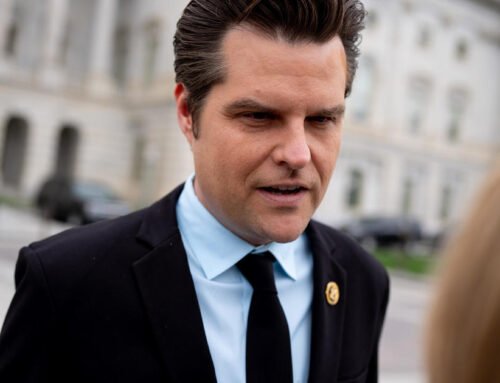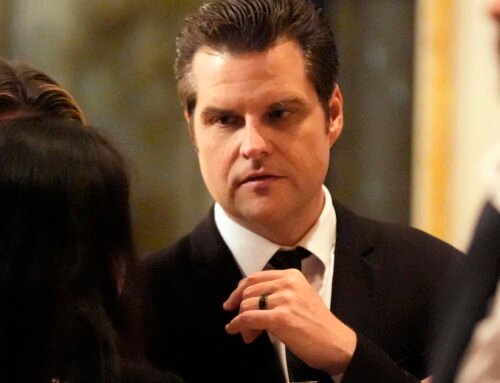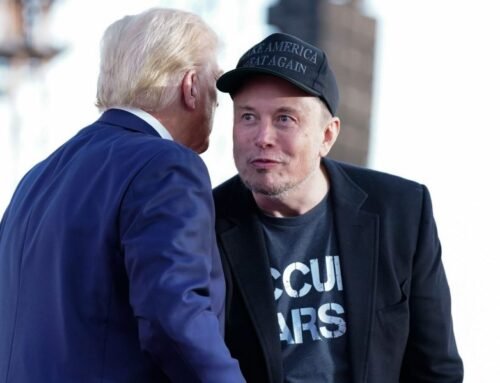What do we know about the Chinese Mar-a-Lago intruder?
The Chinese woman charged with trespassing at Trump’s Mar-a-Lago went on trial Sept. 9. Here’s what we know about her.
The Chinese woman charged with trespassing at Trump’s Mar-a-Lago went on trial Sept. 9. Here’s what we know about her.
Chinese businesswoman Yujing Zhang caught the eye of the receptionist at President Donald Trump’s private Mar-a-Lago club as soon as she walked through the palatial front door after 12 noon on March 30, according to testimony presented in federal court Tuesday.
The Mar-a-Lago receptionist, Ariela Grumaz, had never seen Zhang before and noticed the stranger was wearing a long gray evening dress — oddly formal for lunchtime — and shooting video with her phone in the club’s ornate lobby. Then Zhang breezed by the receptionist into a lounge area.
“As soon as she entered the lobby, you could see she was fascinated by the decorations and that’s when I realized she had never been here before,” Grumaz testified at Zhang’s trespassing trial in Fort Lauderdale federal court.
And so began the encounter that would lead to Zhang’s arrest by federal agents on felony charges of trespassing at Mar-a-Lago and lying to a federal agent, instigated not by the government security that surrounds President Trump and his family but by an employee of his private company, the Trump Organization.
If convicted by the 12-member jury, Zhang, 33, who has chosen to represent herself in court, faces up to six years in prison.
Zhang, who says she is a successful businesswoman from Shanghai, is also under scrutiny from a federal counterintelligence investigation, although she has not been charged with spying. She has denied any wrongdoing, speaking infrequently during a trial that began in unusual fashion Monday when she showed up in a jail uniform rather than the civilian clothes that had been provided to her. On Tuesday, Zhang occasionally objected to the government presenting certain evidence such as records from her iPhone 7 but was consistently overruled by U.S. District Judge Roy Altman.
Zhang had the chance to present a defense Tuesday afternoon — but chose to rest her case without calling a witness, asking a question, presenting any exonerating evidence or testifying herself. In closing arguments, however, Zhang declared her innocence.
“I do think I did nothing wrong,” said Zhang, speaking English. “I did no lying.”
Assistant U.S. Attorney Rolando Garcia countered that Zhang is still lying. “She said she didn’t do anything wrong,” he said. “Well, she clearly did something wrong. She lied to a federal agent.”
Jury deliberations will begin Wednesday morning.
Federal prosecutors are basing their case on evidence that Zhang knew she had no reason to enter the president’s club and nonetheless lied her way in. Grumaz, the receptionist, proved a valuable witness Tuesday.
That afternoon at Mar-a-Lago, Grumaz recalled in her testimony, she stopped the Chinese woman and asked for her name. She said Zhang was not on the list of members or guests at the president’s private club. Zhang showed the receptionist something on her cellphone indicating she was attending a United Nations friendship event between China and the United States that evening. But Grumaz said she checked with the catering manager and found there was no such event scheduled.
Zhang had in fact bought a ticket for a Safari Night charity gala originally on the calendar for that evening. But the event had been canceled a few days before, something Zhang was well aware of at the time, prosecutors argued.
Yujing Zhang graduated from Shanghai Finance and Economic University with a business degree in 2008.
After their initial conversation, Grumaz testified, she got suspicious and told a Secret Service agent in the lobby about Zhang’s presence. “She was acting very weird and strange,” Grumaz said. “We didn’t know how she got on the premises. So I had to speak with him.”
As Secret Service agent Samuel Ivanovich spoke with Zhang, she disappeared into the women’s bathroom. The agent grew anxious, so Grumaz said she volunteered to go into the bathroom to get Zhang.
“As soon as I stepped inside the door, I could see her texting on the phone,” Grumaz testified. “I called and said, ‘Ma’am, can you please step outside?’ “
Zhang left the bathroom and was immediately surrounded by a group of Secret Service agents.
Ivanovich, who testified after the receptionist, said he asked Zhang for her identification and she provided two passports from the People’s Republic of China, one expired and one still valid. She informed him that she was at Mar-a-Lago for the U.N. friendship event and that she arrived early to familiarize herself with the property and take pictures, Ivanovich testified.
The agent said he learned from Mar-a-Lago security staff that Zhang originally told them at a checkpoint on the perimeter of the property that she wanted to go to the pool. The staff incorrectly believed she was related to a member. When asked by a prosecutor whether Zhang would have been allowed onto the property if she had said she came to attend the United Nations friendship event, Ivanovich said, “No, she would not.”
Ivanovich said that he and other Secret Service agents escorted Zhang off the premises.
He said that when the agents began to search the electronic devices inside her purse, Zhang “became aggressive in nature.” But she agreed to go to the Secret Service’s West Palm Beach office for questioning, he said.
Ivanovich said Zhang explained during the interview that she made arrangements for her trip to Mar-a-Lago through a man named “Charles,” and that she also planned to visit other parts of the United States. She told him that she only knew Charles through their phone messaging on the “We Chat” social media app popular in China.
The agent said he pressed Zhang about why she initially told the Mar-a-Lago security staff that her reason for coming to the president’s private club was to go to the pool.
“She stated that she did not say that,” Ivanovich testified.
Federal agents later searched her iPhone 7 and discovered that Zhang had received text messages from “Charles,” who told her that the March 30 event had been canceled days before she left China. But Zhang flew from Shanghai via Newark to Palm Beach on March 28 anyway, Ivanovich said.
After Zhang’s arrest, agents searched her hotel room and found a bevy of electronic devices, including a hidden-camera detector, along with $7,600 in U.S. currency and $600 in Chinese currency.
Off the calendar
The Herald has reported that the man who sold Zhang her ticket is a Chinese entrepreneur named Charles Lee.
Lee is part of a burgeoning industry that sells access to elite events around the world, including some held at Trump properties, to China’s status-conscious business class. The Safari Night Zhang hoped to attend had been promoted on social media by Lee as well as by Cindy Yang, a South Florida businesswoman involved in the same industry. The Safari Night was canceled after the Herald revealed Yang was peddling access at Trump properties and political fundraisers.
Cindy Yang raised the $50,000 needed to have her photograph taken with President Trump.
On Tuesday, FBI linguist Catherine Chang testified that Zhang’s trip to Mar-a-Lago was forged in a contract between the Beijing Peace Friendship Enterprise Management Company and Zhang on Feb. 14, 2019. The cost of the trip was $20,000. The Herald’s reporting found that Charles Lee’s now-defunct website instructed clients to pay the Beijing Peace Friendship company.
During her testimony, Chang cited an Excel spreadsheet summarizing a series of audio and text messages that were extracted from Zhang’s iPhone. They showed Zhang was told by the trip organizer before leaving China that the March 30 Mar-a-Lago event had been canceled.
“Here’s the thing,” a March 18 audio message on Zhang’s phone said. “I just read an email. The event of March 30 will be canceled. … I can refund you the money.”
Eight days later, Zhang received another voice message from the organizer: “Hey gorgeous. I just read the email in the morning [about the Trump event].” The organizer suggested that Zhang could attend another event elsewhere featuring Bill and Hillary Clinton. “I suggest you attend this event. You can meet these two famous people in one setting.” Then, the organizer suggested another event with investor Warren Buffett. (The government has not identified the organizer as being Charles Lee.)
On March 27, Zhang sent a text message to the trip organizer, saying she was not interested in those events with the Clintons and Buffett. “Forget it,” she texted. “Just get a refund.”
But that same day, Zhang booked her own ticket, paying $2,000 in cash, to fly from China to the United States.
She sent a few more messages that day, saying, “Wire it straight to my account. I’m not going. … Need the money urgently. Go ahead and credit the money to my account by this weekend.”
As the government made its case, the second day of Zhang’s trial proved less bizarre than the first.
The defendant showed up for Monday morning jury selection in her jail uniform, leading Altman, the judge, to send her back to change. Then she delivered only the briefest of opening statements after Altman coaxed her into addressing jurors, saying: “Good afternoon, grand jury. What I want to say … I don’t believe I did anything wrong. And thank you, USA.” (On Tuesday, she wore her civilian clothes, the same outfit of rose-gold blouse and khaki slacks that she changed into the previous day.)
Zhang, who has no legal training, has refused assistance from the Federal Public Defender’s Office, which has attorneys available to her in the courtroom. She missed opportunities Monday to exploit potential weaknesses in the prosecution’s case, including pointing out that she was originally allowed into Mar-a-Lago because club staff thought she was related to a member. She also had a chance to seize on a cab driver who could not positively identify her in court from a distance of less than 10 feet. The driver had testified that he drove Zhang around Palm Beach on March 29 and said she told him she did not have an invitation to Mar-a-Lago.
But instead of putting on a defense, Zhang stayed mostly mute during the two-day trial.








